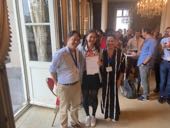20th GEIA Conference 21-23 June 2023
20th GEIA Conference - Towards mitigating air pollutant and greenhouse gas emissions
21-23 June 2023
Royal Museums of Fine Arts of Belgium, Brussels
IGAC Sponsored
Cathy Liousse, Laboratoire d’Aérologie, Université de Toulouse, CNRS, UPS, Toulouse, France, (cathy.leal-liousse@aero.obs-mip.fr).
Brian Mc Donald, National Oceanic and Atmospheric Administration (NOAA), USA, (brian.mcdonald@noaa.gov).
Paulette Middleton, Panorama Pathways, USA, (paulette@panoramapathways.net).
Claire Granier, (1) Laboratoire d’Aérologie, Université de Toulouse, CNRS, UPS, Toulouse, France; (2) NOAA Chemical Sciences Laboratory, Boulder, Colorado, USA and (3) CIRES, University of Colorado Boulder, Boulder, Colorado, USA, (Claire.Granier@noaa.gov). Trissevgeni Stavrakou, Belgian Institute for Space Aeronomy, Belgium, (jenny@aeronomy.be).
Participants (List of countries)
Argentina, Austria, Bangladesh, Belgium, Brazil, Canada, Chile, China, Colombia, Czech Republic, Denmark, Egypt, France, Germany, Greece, India, Italy, Ivory Coast, Japan, Kenya, Mexico, Netherlands, Norway, Portugal, South Korea, Spain, Sweden, Switzerland, Thailand, United Kingdom, United States.
![]()
![]()
![]()
![]()
![]()
![]()
Background
IGAC financially sponsored this conference as part of its ongoing support of the Global Emissions Initiative (GEIA), an IGAC activity. GEIA was established in 1990 to provide emissions data and information to the scientific and stakeholder communities.
Event Summary
The 20th international conference of the GEIA program (Global Emissions InItiAtive) was held in Brussels, Belgium, bringing together 153 researchers, including 62 young researchers, from 31 countries.
The international GEIA program includes researchers working on the science of emissions -- a gateway to studies of air quality, health and climate change. The main goals of GEIA are (1) Promoting broad and consistent access to emissions information, (2) Building the scientific basis for emissions data by enhancing analysis of emissions processes and (3) Strengthening the community of emissions stakeholder groups.
The 20th GEIA conference,“Towards the reduction of emissions of air pollutants and greenhouse gases”, included four themes: (1) Anthropogenic and natural emissions from local to global, (2) Top-down Emissions & Satellite Analyses, (3) Integrated studies of air pollutant and greenhouse gas emissions, and (4) Mitigation efforts including real world examples.
A special session was dedicated to discussion on GEIA Working Groups with updates, opportunities and next steps. A Town Hall breakout session invited participants to contribute to a lively interactive discussion of how GEIA can best support decision making processes and how we can best organise ourselves to support mitigation of air pollution and greenhouse gases. Finally, a demonstration of ECCAD website (the GEIA portal providing data access and tools for data analysis) was provided showing the emerging capabilities for displaying and analyzing emissions data.
With 32 oral presentations and 112 posters, the conference was rich in information, innovative scientific results, debates and perspectives. Two poster prizes were awarded to Megan He (Yale University) and Glenn-Michael Oomen (BIRA-IASB), who are both early career scientists. The conference highlighted the intense GEIA activities on developments of bottom-up global/national/regional anthropogenic emission inventories, a growing interest in both biogenic and anthropogenic urban emission inventories and a few innovative emission studies on less-known pollutants and sources. The conference also brought into focus these needs: to constrain emissions through modeling, better characterize source emissions from measurements, and continue to reduce emissions uncertainties.
The conference showed an increasing number of “top-down” emissions studies since the last GEIA conference, in part thanks to the coordination of the conference with the AMIGO IGAC activity workshop. These presentations and posters demonstrated the promise of satellite- inferred emissions as a check on bottom-up emission inventories. The conference underlined the importance of recognizing challenges related to satellite observation and model errors
when inferring emissions. A future goal is to move towards multi-species / sectoral emissions inversions especially with next-generation geostationary observations.
The conference also pointed out the interest of GEIA to develop integrated studies of air pollutants and greenhouse gas emissions. With a good spread in research across continents, the presenting studies showed how the multispecies analysis can be beneficial for quantifying AQ / GHG co-benefits, the inference of fossil CO2, and source attribution. The integrated emission inventories provide potential for mitigation, and baselines for predictions and projections.
An important question raised deals with the responsibility of scientists to engage with stakeholders. The last theme of the conference presented GEIA community mitigation efforts: the need of better targeting and documenting the different sectors of activities and their relative emissions as a first step for possible mitigations; the development of mitigation tools to support efficient mitigation strategy design; and estimates of mitigation actions’ impacts on air quality, health and climate.
In the years ahead, GEIA will continue its mission to improve emissions understanding in dealing with issues around megacity air pollution, regional and international air quality, and long-term climate change. The GEIA working groups, central to addressing these challenges, will be expanding to better incorporate regional (Asia, Africa, Latin America/Caribbean) and urban analyses.
![]()

20th GEIA Conference Participants

Brussels, Belgium


Poster prize winners: Megan He (Yale University, left) and Glenn-Michael Oomen (BIRA-IASB, right).